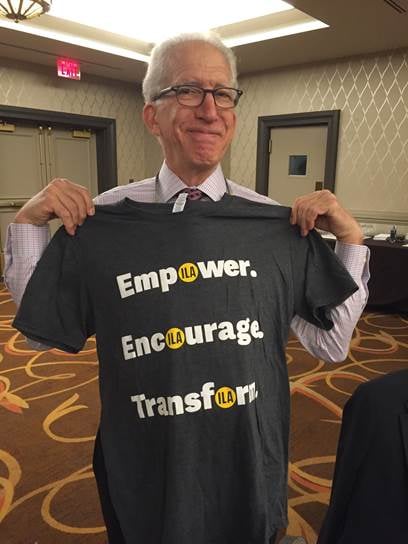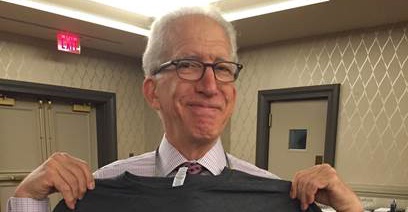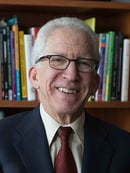
by Emily Brown Hoffman, Colleen E. Whittingham, & Kristine M. Schutz
On February 3, 2018, Dr. Bill Teale - our mentor, our friend, our teacher - passed away. Most of you likely recognize Bill’s name from his groundbreaking work in emergent literacy. Yes, he is the Teale from Teale and Sulzby’s 1986 book, Emergent Literacy: Writing and Reading. In this book, he (with Elizabeth Sulzby) introduced the field to a new way of thinking about young children’s literacy development. Or, you may know him from one of his more recent publications, No More Teaching a Letter a Week, outlining the ins and outs of alphabet instruction, with Rebecca McKay. However, what you might not know is that Bill’s research and impact extend far beyond that of this groundbreaking theory and subsequent works that have shaped teaching and learning in early childhood classrooms throughout the world.
Bill was a renowned scholar with significant contributions to the fields of emergent literacy and early literacy instruction, yet, it is Bill’s investment in people, in relationships, and in interactions that are most worthy of our admiration. You see, in everything he did, Bill was a teacher. He was our favorite teacher. And the thing about favorite teachers is that, most often, the lessons that shape their students’ learning stretch far beyond the walls of classrooms. Bill taught and modeled teaching in ways that made impactful differences in each of our lives. By sharing a few of lessons we’ve learned from Bill, we revisit some of the ways he taught us and countless others not only about literacy, but about the world. As we share some of these lessons, we think you will see your favorite teacher reflected in him too.
Be open to new possibilities.
Bill’s early work on emergent literacy spurred new ways of thinking about how young children continually engage in the process of learning to read and write from their earliest years. The concept represented a significant shift from the dominant belief that children needed to master certain “pre-reading” skills before they were “ready” to learn to read. In Bill’s research and writing, he resisted seeing the world through old lenses; this openness enabled him to see children’s meaning-making, reading, and writing in novel ways. His innovative thinking fundamentally reshaped how we think about the teaching and learning of early literacy.
Bill taught us to be open to new possibilities. As teachers in an ever-evolving world, we need to be open to new ways of engaging in teaching and learning - something Bill was dedicated to throughout his career. Each year brings a unique group of children, with different experiences and strengths, into our worlds. Although talk about “best practice” is common, a key lesson we learned from Bill is to remember that best practices are ones responsive to the children we teach. In each moment of teaching, existing practices transform to new ones as we tailor instruction to respond to the experiences and identities of our learners and teach them how their literacies can amplify their voices from their local communities and our country. We must be open to new possibilities so every year we can discover new and better ways of connecting with and supporting learners.

Listen better. Speak less.
In the past couple of weeks, we’ve heard many stories from people who interacted with Bill over the course of his career and life. To a person, he was a genuine and focused listener. He was curious about people’s stories and thinking. This genuine inquiry was evident in his scholarship, teaching, and service to the field. In recent years, Bill often ‘took stock’ of the early literacy research landscape, modeling the importance of listening to insights from the past, synthesizing contributions from the present, and making a plan to address the needs of the future. Bill took a similar approach to listening to people. He asked thoughtful questions, took time to listen to the answers, and reflectively built his own ideas from conversations with others. He always told people how much he had learned from talking with them, listening first and speaking later.
Bill taught us to listen better and speak less. We strive to emulate this practice in our classrooms. So often the urgency and accountability of the context in which we teach sideline authentic opportunities for stopping and listening closely to children’s ideas. We must challenge ourselves to be better listeners. And this requires saying less. While creating space to foreground children’s thinking and stories might feel challenging given the pressure of accountability and evaluation, we need to make it happen. For when we do, our students reveal amazing insights and understandings about texts and their understandings of the world. Their brilliance and sense-making are gifts that we will prioritize.
Walk softly and carry a big stack of books.
Bill often said, “Let’s talk about books.” Walking into Bill’s office, we are surrounded by books—on shelves, in boxes, piled on his desk and his library stool. We see new books, old books, board books, picture books, graphic novels, “good” books, and “bad” books (for examples, of course). Bill had favorite books to share with colleagues and take to his classes, as well as books yet to be read. He could talk about books in so many different ways – too many to capture here. He was a patron of high-quality, diverse children’s and young adult literature in homes, classrooms, libraries, and communities worldwide, and he never missed an opportunity to share such texts with others.
Bill taught us to walk softly and carry a big stack of books. Books matter. Talking about text matters, and the voices and lives represented in those texts matter. He taught us an unwavering pursuit and commitment to ensure books are the cornerstone of our classrooms and communities. We will fill our shelves (and tables and bags and stools!) with texts that represent our students’ lives and the world outside the classroom walls. We will have deep conversations about literature and the meaning behind and lessons learned from pictures and words. And we will pursue ways to get high-quality, interesting books into the hands of our students, their families, and their communities to bring us all together.
Learn together, laugh together.
Bill served as a champion and advocate for literacy because, as he said, literacy “not only gives us the skills... but it also makes us human.” Both learning and laughter were commonplace at any gathering, meeting, or professional development Bill coordinated. Whether passing Bill in the hallway or huddled around his desk solving a problem that had surfaced in our work together, we walked away with both new knowledge and a smile. Bill learned about others’ interests, ideas, and lived experiences. And then he built bridges; connecting people with texts or other people that would not only complement their own views on literacy, teaching, learning, and life - but also push and extend their collective thinking. One of Bill’s more recent ventures was a focus on literacy leadership through collaboration - bringing together principals, literacy coaches, and teachers to talk about the importance of fostering school contexts that support strong literacy environments and instruction.
Bill taught us to learn together and laugh together. After all, we do our best thinking and learning together. Within our own schools, we will create and pursue opportunities for educators with similar and different roles to come together within and surrounding practice to engage in sincere partnerships that center around authentic, joyful teaching and learning. In the same vein, we will create collaborative structures for children in our classrooms, helping students develop 21st Century literacies in respectful consort with each other instead of in isolation. Bill taught us the importance and benefits of learning together, and while we’re at it, have some fun.
Our Favorite Teacher
Bill’s life work left an indelible mark on the fields of early literacy teaching and learning, children’s literature, higher education... and on us. He is our favorite teacher for so many reasons. He not only taught us so much about early literacy pedagogy, he taught us to be open, to listen, to create a world around books, and to connect with each other to build something better. These lessons from Bill were threaded through the curriculum that was his life. He lived and breathed these ideas every day, in every interaction. They represent who he was in class, in his office, in schools, on the phone, and out at dinner.
The lessons we learned from Bill will continue to guide us, in and outside the walls of our classrooms. We are committed to teaching for a better world, and through the lessons we have learned from Bill, hope we too, can someday become someone’s favorite teacher.

William Teale was Professor, University Scholar, and Director of the Center for Literacy at the University of Illinois at Chicago. His work was central to bringing forth the concept of emergent literacy, and he published widely in the field for the past 35 years.


